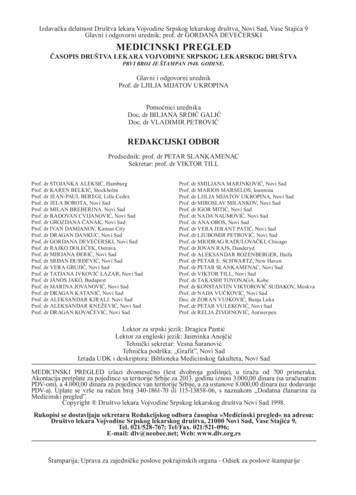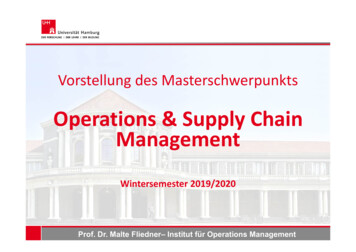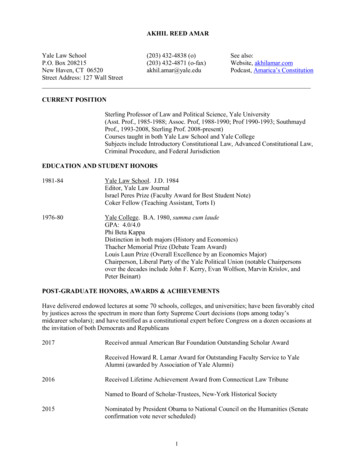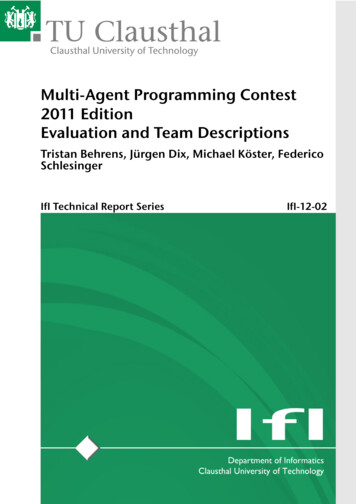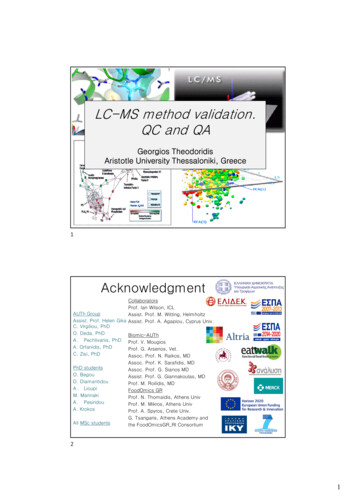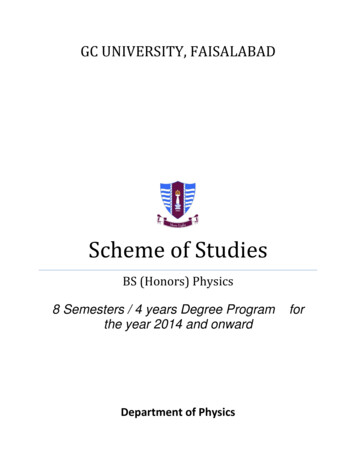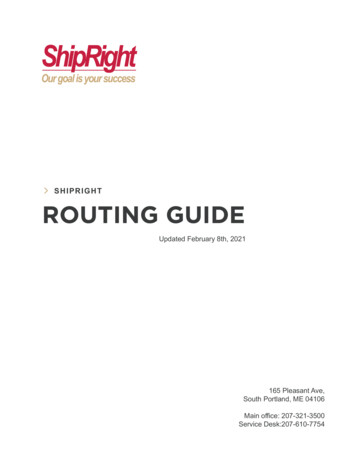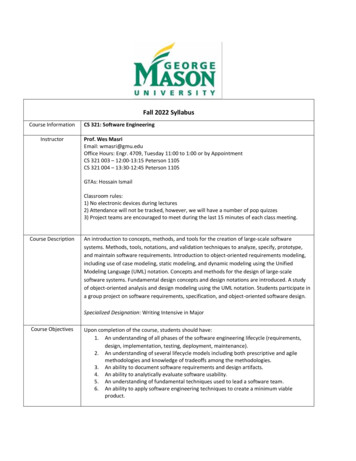
Transcription
Fall 2022 SyllabusCourse InformationInstructorCS 321: Software EngineeringProf. Wes MasriEmail: wmasri@gmu.eduOffice Hours: Engr. 4709, Tuesday 11:00 to 1:00 or by AppointmentCS 321 003 – 12:00-13:15 Peterson 1105CS 321 004 – 13:30-12:45 Peterson 1105GTAs: Hossain IsmailClassroom rules:1) No electronic devices during lectures2) Attendance will not be tracked, however, we will have a number of pop quizzes3) Project teams are encouraged to meet during the last 15 minutes of each class meeting.Course DescriptionAn introduction to concepts, methods, and tools for the creation of large-scale softwaresystems. Methods, tools, notations, and validation techniques to analyze, specify, prototype,and maintain software requirements. Introduction to object-oriented requirements modeling,including use of case modeling, static modeling, and dynamic modeling using the UnifiedModeling Language (UML) notation. Concepts and methods for the design of large-scalesoftware systems. Fundamental design concepts and design notations are introduced. A studyof object-oriented analysis and design modeling using the UML notation. Students participate ina group project on software requirements, specification, and object-oriented software design.Specialized Designation: Writing Intensive in MajorCourse ObjectivesUpon completion of the course, students should have:1. An understanding of all phases of the software engineering lifecycle (requirements,design, implementation, testing, deployment, maintenance).2. An understanding of several lifecycle models including both prescriptive and agilemethodologies and knowledge of tradeoffs among the methodologies.3. An ability to document software requirements and design artifacts.4. An ability to analytically evaluate software usability.5. An understanding of fundamental techniques used to lead a software team.6. An ability to apply software engineering techniques to create a minimum viableproduct.
CourseMethodologyRequired textbook(s)and/or materialsComputerRequirementsCS 321 includes Writing Intensive (WI) activities that, together with those of CS 306 (Ethicscourse), meet the GMU WI Requirements in the BS CS Program (http://wac.gmu.edu). Thismeans you will write 1750 graded words (or about 7 standard pages). For this course, part ofthe writing will include an individual essay on your experiences working with your team.The class format will combine reading, lectures, presentations, and other learning tools. Theclass will be interactive and require every student to be engaged in the classroom discussionand assignments. In addition to the lectures, screencasts and timely completion of assignments,every student will be expected to be an active participant and a dedicated individual applyingwhat you learn to every element of the course work.Lecture notes are essential.Optional Reading Resources: Engineering Software Products: An Introduction to Modern Software Engineering, IanSommerville, 1st edition, Pearson Software Engineering, Ian Sommerville, 9th/10th Edition, Addison-Wesley / PearsonEducation Limited. ntentsHardware: You will need access to a Windows or Macintosh computer with at least 2 GB ofRAM and access to a fast and reliable broadband internet connection (e.g., cable, DSL). A largerscreen is recommended for better visibility of course material. You will need speakers orheadphones to hear recorded content and a headset with a microphone is recommended forthe best experience. For the amount of Hard Disk Space required taking a distance educationcourse, consider and allow for:1.2.The storage amount needed to install any additional software andSpace to store work that you will do for the course.If you consider the purchase of a new computer, please go to Patriot Tech to seerecommendations.Software: You will need a browser and operating system that are listed compatible or certifiedwith the Blackboard version available on the myMason Portal. See supported browsers andoperating systems. Log in to myMason to access your registered courses. Some courses mayuse other learning management systems. Check the syllabus or contact the instructor fordetails. Online courses typically use Acrobat Reader, Flash, Java, and Windows Media Player,QuickTime and/or Real Media Player. Your computer should be capable of running currentversions of those applications. Also, make sure your computer is protected from viruses bydownloading the latest version of Symantec Endpoint Protection/Anti-Virus software for freehere.Students owning Macs or Linux should be aware that some courses may use software that onlyruns on Windows. You can set up a Mac computer with Boot Camp or virtualization softwareso Windows will also run on it. Watch this video about using Windows on a Mac. Computersrunning Linux can also be configured with virtualization software or configured to dual bootwith Windows.Note: If you are using an employer-provided computer or corporate office for class attendance,please verify with your systems administrators that you will be able to install the necessaryapplications and that system or corporate firewalls do not block access to any sites or mediatypes.
Course WebsiteParticipationRules andExpectationsCS Department Recommended Computer Systems for Students can be found here.Blackboard will be used for this course. You can access the site athttp://mymasonportal.gmu.edu. Login and click on the “Courses” tab. You will see CS 321.NOTE: Username and passwords are the same as your Mason email account. You must haveconsistent access to an internet connection in order to complete the assignments in this coursethrough Blackboard (http://mymason.gmu.edu).MS Teams (Link will be shared on Blackboard)Learning can only happen when you are playing an active role. It is important to place moreemphasis on developing your insights and skills, rather than transmitting information.Knowledge is more important than facts and definitions. It is a way of looking at the world, anability to interpret and organize future information. An active learning approach will more likelyresult in long-term retention and better understanding because you make the content of whatyou are learning concrete and real in your mind.Although an active role can look differently for various individuals, it is expected in this classthat you will work to explore issues and ideas under the guidance of the professor and yourpeers. You can do this by reflecting on the content and activities of this course, askingquestions, striving for answers, interpreting observations, and discussing issues with yourpeers.In correspondence/communication students will be expected to:a) Be professional and respectful in correspondenceb) Make reasonable requests of the instructor. We will be happy to clarify coursematerial and answer legitimate questions; however, please exhaust otherinformation sources (e.g., syllabus, Blackboard, Discussion board) for answering yourquestion before contacting me and remember, “Poor planning on your part does notconstitute an emergency on my part”In regard to honesty in work students will be expected to:a) Review the University integrity and honesty policies in the student handbook forguidelines regarding plagiarism and cheating (summarized below). I will gladly clarifymy stance on any questionable or “grey area” issues you may have.b) Refrain from dishonest work as it will receive a minimum penalty of zero on theassignment and a maximum penalty of a zero for the course with a report to theHonor committee. The GMU Honor Code requires that faculty submit any suspectedHonor Code violations to the Honor Committee. Therefore, any suspected offensewill be submitted for adjudication.Contesting of grades on any/all submissions must be requested within one week of the item'sreturn. No grade changes will be considered subsequent to that deadline, or after the finalexam meeting.Mason Honor CodeThe complete Honor Code is as follows:To promote a stronger sense of mutual responsibility, respect, trust, and fairness among allmembers of the George Mason University community and with the desire for greater academicand personal achievement, we, the student members of the university community, have setforth this honor code: Student members of the George Mason University community pledgenot to cheat, plagiarize, steal, or lie in matters related to academic work.(From the Catalog – catalog.gmu.edu)
Cheating PolicyPlagiarism and theInternetAll students are expected to abide by the GMU Honor Code and the CS Department HonorCode. This policy is rigorously enforced. All class-related assignments are considered individualefforts unless explicitly expressed otherwise (in writing). Review the university honor code andpresent any questions regarding the policies to instructor. Cheating on any assignment will beprosecuted and result in a notification of the Honor Committee as outlined in the GMU HonorCode.Any form of cheating on an activity, project, or exam will result in zero points earned.“Cheating” includes, but is not limited to, the following: reviewing others’ exam papers,having ANY resources utilized when not allowed, collaborating with another student duringan individual assignment.If you have questions about when the contributions of others to your work must beacknowledged and appropriate ways to cite those contributions, please talk with theprofessor or utilize the GMU writing center.Copyright rules also apply to users of the Internet who cite from Internet sources.Information and graphics accessed electronically must also be cited, giving credit to thesources.This material includes but is not limited to e-mail (don't cite or forward someone else's e-mailwithout permission), newsgroup material, information from Web sites, including graphics.Even if you give credit, you must get permission from the original source to put any graphicthat you did not create on your web page. Shareware graphics are not free. Freeware clipartis available for you to freely use. If the material does not say "free", assume it is not.Individuals withDisabilitiesAcademic Integrityand InclusivityStudent PrivacyPolicyE-Mail PolicyPutting someone else's Internet material on your web page is stealing intellectual property.Making links to a site is, at this time, okay, but getting permission is strongly advised, sincemany Web sites have their own requirements for linking to their material. Review the HonorCode here.Students with documented disabilities should contact the Office of Disability Services (703) 9932474) to learn more about accommodations that may be available to them.(From the 2019-2020 Catalog – catalog.gmu.edu)Students with documented disabilities should speak with the instructors ASAP to discussaccommodations.This course embodies the perspective that we all have differing perspectives and ideas and weeach deserve the opportunity to share our thoughts. Therefore, we will conduct our discussionswith respect for those differences. That means, we each have the freedom to express our ideas,but we should also do so keeping in mind that our colleagues deserve to hear differing thoughtsin a respectful manner, i.e. we may disagree without being disagreeable. http://oai.gmu.edu/George Mason University strives to fully comply with FERPA by protecting the privacy ofstudent records and judiciously evaluating requests for release of information from thoserecords.Please see George Mason University’s student privacy eb: masonlive.gmu.eduMason uses electronic mail to provide official information to students. Examples include noticesfrom the library, notices about academic standing, financial aid information, class materials,assignments, questions, and instructor feedback.Students are responsible for the content of university communication sent to their Mason email account and are required to activate that account and check it regularly.
Students are also expected to maintain an active and accurate mailing address in order toreceive communications sent through the United States Postal Service.(From the 2017-18 Catalog – catalog.gmu.edu)Course Grading &EvaluationCourse Grading policy:QuizzesTechnology Presentation/TutorialSWE Topic Presentation/Essay (WI)Writing Assignment (WI)Discussion Board (WI)Project Deliverables: (52%)P0: Team FormationP1: RequirementsP2: Software ArchitectureP3: TestingP4: Presentation/VideoP5: Project report (WI)P6: Peer EvaluationInstructor Assessment (of each team member)30%5%5%5%3%1%7%7%7%7%7%8%8%The following scale will be applied to compute final course letter grades:A ( 98.0%) A ( 92.0%) A- ( 90.0%)B ( 88.0%) B ( 82.0%) B- ( 80.0%)C ( 78.0%) C ( 72.0%) C- ( 70.0%)D ( 60.0%) F ( 60.0%)Quizzes(30%)Writing l(5%)SWE TopicPres/Essay (WI)(5%)Team Project(52%)5 to 8 quizzes (some scheduled, others are not)1) Writing Assignment 1 (5%)2) SWE Topic Essay (5%)3) Project Report (7%)4) Discussion Board (3%): Two to four online discussionsEach team (3 to 5 students) will select a combination of technologies to study and present tothe class. A hands-on demonstration is expected. A list of potential technologies is provided atthe end of this document. Special care should be given to the ability of testing pure businesslogic and GUI-heavy applications. This is a very crucial preparation for the project (30 to 40minutes).One or more students will pick and present a SWE topic not covered in this course. The topicshould be based on research paper(s) and/or industry article(s). The deliverable will also includean essay that will satisfy part of the WI requirements. If several students are involved, thepresentation length and essay size should be scaled accordingly.CS 321 will have a software engineering project that requires students to participate in workingteams where students organize, manage, and practice the software engineering lifecycle. Theteam project will cover software requirements, architecture, design, coding, and testing. Yourfinal grade for this component will include peer evaluation grades provided by your teammates.Also, each team member will be assessed by the instructor.
Below are some of the technologies that previous CS321 teams have 19)20)21)22)23)24)25)26)Backend: Nodejs, Expressjs, EJS, and MongodbFrontend: HTML,CSS/SCSS, Javascript, and Bootstrap 5Backend: Nodejs, Expressjs, EJS, Mongodb, Multer, Gridfs, Jest, and SupertestSpring Boot, JAVA, My SQL and CSS/BootStrap/HTMLQUnit/Jest/JavascriptJUnit, Mockito, AssertJFlutter, Java Spring, HTTP, MongoDB (NoSQL)Firebase AuthenticationFirestoreStatement coverage tools (Jacoco, Flutter’s testing framework)Selenium, JestJavaScript/TypeScriptRESTful APIAngular/ReactMEAN stack: JavaScript-based framework (MongoDB, Express, Angular, and Node)Relational vs. NoSQL databasesCloud computing: AWS, Azure, Google Cloud HerokuDependency Injection frameworksSpring, SpringBootIssue Tracking systems, e.g. JIRADevOps CI/CDMobile Development: Android, IOS, FlutterTesting tools, Coverage Tools, GUI Testing ToolsAgile supporting tools (e.g., estimation, prioritization)Chrome Extensions, Discord Bots, Twitter BotsOtherSome useful links: Spring Boot Annotations: https://www.baeldung.com/spring-boot-annotations Thymeleaf with Spring: https://www.baeldung.com/thymeleaf-in-spring-mvc Mockito tutorial series: https://www.baeldung.com/mockito-series Jest and Nodejs Sourcesohttps://www.youtube.com/watch?v FgnxcUQ5vho&t 197sohttps://www.youtube.com/watch?v ENrzD9HAZK4 velopment/ https://www.youtube.com/Spring Security Tutorial https://www.w3schools.com/html/ https://getbootstrap.com/
Jest Testing Online r.mozilla.org/en-US/docs/Web/JavaScript/A re-introduction to JavaScripthttps://www.youtube.com/watch?v w7ejDZ8SWv8&ab channel TraversyMedia
software systems. Fundamental design concepts and design notations are introduced. A study of object-oriented analysis and design modeling using the UML notation. Students participate in a group project on software requirements, specification, and object-oriented software design. Specialized Designation: Writing Intensive in Major


